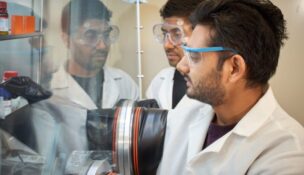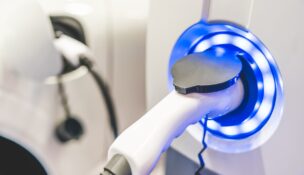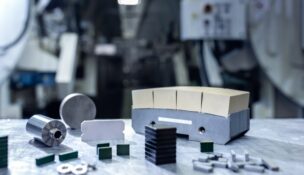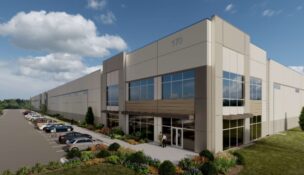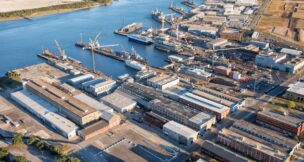Production of key South Carolina export drives expansion for Charleston area plant
Ross Norton //January 31, 2024//
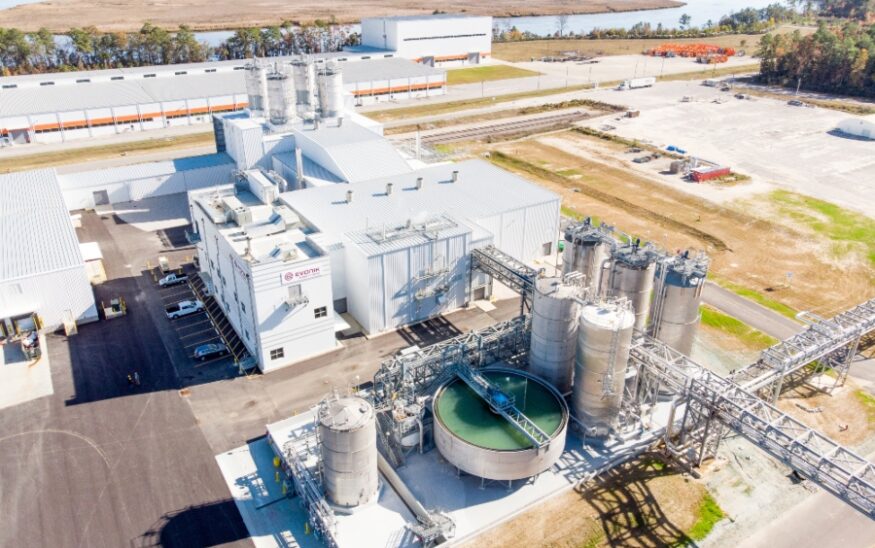
The Evonik plant in Goose Creek is being expanded to increase capacity, a move largely driven by tire production. (Photo/Evonik Industries AG)

The Evonik plant in Goose Creek is being expanded to increase capacity, a move largely driven by tire production. (Photo/Evonik Industries AG)
Production of key South Carolina export drives expansion for Charleston area plant
Ross Norton //January 31, 2024//
- Evonik will increase capacity at the Lowcountry plant to grow production by 50%.
- Increased demand is driven by tire production.
- South Carolina tiremakers manufacture 144,000 tires each day.
- There are 12 tire plants in South Carolina.
- Other uses for precipitate silica include as an ingredient in toothpaste and coatings.
What do your tires have in common with your toothpaste?
Both contain precipitated silica, according to Evonik, a manufacturer of the ingredient which announced plans today to expand production of precipitate silica at its Goose Creek plant by 50%.
The Germany-based company did not say how much it would spend on the expansion, but called it a “mid-double-digit million Euro amount,” in a news release. At the Jan. 31 exchange rate, 10 million euros would be $10.8 million.
Steffen Boberg, head of market communication for the silica line, did not say how many new jobs the expansion would create, but that “we expect to create additional full-times jobs at the site and increase the number of our workforce significantly.” He said in an email the site, which includes a lab, manufacturing plant and warehouse, currently has 30 employees.
Evonik said tire production, more than toothpaste or other end products, is driving an increased demand for precipitate silica.
“The new line in South Carolina is satisfying the high demand in particular from the tire industry in North America and makes the supply chains of Evonik partners in the region resilient by enabling local silica sourcing,” the company stated in the release.
Silica is a key ingredient for fuel-efficient tires and other products like coatings, the release said. Construction of the new production line is scheduled to begin in mid-2024. Operations will start in early 2026.
“North America is an important strategic growth region for us,” Maike Schuh, chief financial officer of Evonik, said in the release. Schuh is responsible for the company’s Americas region. “With the investment in Charleston, we are strengthening our strategic customer-centric approach and improving our cost and sustainability position. Evonik is investing in innovative and green solutions and technologies that offer our customers superior sustainability benefits.”
South Carolina has 12 tire manufacturing plants, six of which are owned by Michelin, producing 144,000 tires per day, according to Modern Tire Dealer’s 2023 Book of Facts. The Palmetto State is the nation’s leading exporter of tires, with sales exceeding $1.7 billion in 2021, according to the South Carolina Office of the Governor.
“With this expansion, our state-of-the-art Charleston site becomes a major hub for precipitated and sustainable silica products in North America,” said Lauren Kjeldsen, head of Evonik’s Smart Materials Division, which includes the silica business.
Evonik has defined a roadmap toward carbon neutrality for its Charleston site, and the expansion is part of that plan, the release stated.
“The commercial and technical teams have worked intensely in the past years to develop a robust expansion concept, which we will now implement,” Emmanuel Auer, head of the silica business line, said in the release. “The expansion will contribute to meet our sustainability targets by combining the positive handprint of Evonik’s silica technologies with a low carbon footprint. It is underlining Evonik’s commitment to the Science Based Targets initiative.”
The expansion in Charleston fulfills the need for local-to-local supply chains for tires. Moreover, the company plans to introduce circular raw materials to manufacture a brand called Ultrasil Silica to satisfy the sustainability targets of the tire industry.
Tires made with silica reduce fuel consumption by up to 8% compared to conventional passenger car tires, the company said. In North America, the demand for tires with reduced rolling resistance and improved fuel efficiency is experiencing above-average growth. Over the past years, Evonik has continuously invested in modern silica production updates and strategic acquisitions around the globe to further enhance the business. The Charleston facilities are part of a network of 18 precipitated silica production sites globally.
Evonik is one of the world leaders in specialty chemicals. The company is active in more than 100 countries around the world and generated sales of 18.5 billion euros and an operating profit 2.49 billion euros in 2022, the company said.
l





